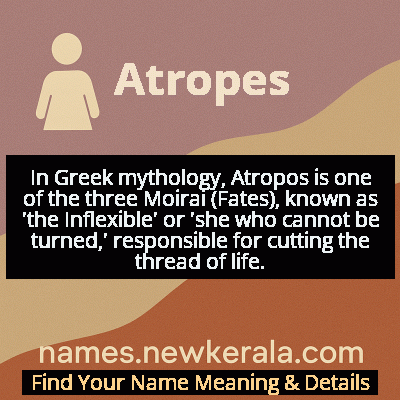Atropes Name Meaning & Details
Origin, Popularity, Numerology Analysis & Name Meaning of Atropes
Discover the origin, meaning, and cultural significance of the name ATROPES. Delve into its historical roots and explore the lasting impact it has had on communities and traditions.
Name
Atropes
Gender
Female
Origin
Greek
Lucky Number
4
Meaning of the Name - Atropes
In Greek mythology, Atropos is one of the three Moirai (Fates), known as 'the Inflexible' or 'she who cannot be turned,' responsible for cutting the thread of life.
Atropes - Complete Numerology Analysis
Your Numerology Number
Based on Pythagorean Numerology System
Ruling Planet
Uranus (Rahu)
Positive Nature
Strong sense of order, loyal, practical, and disciplined.
Negative Traits
Stubborn, overly serious, rigid, and prone to feeling restricted.
Lucky Colours
Blue, gray.
Lucky Days
Saturday.
Lucky Stones
Blue sapphire.
Harmony Numbers
1, 7, 8.
Best Suited Professions
Managers, engineers, accountants, organizers.
What People Like About You
Dependability, discipline, practicality.
Famous People Named Atropes
Atropos (Mythological)
Divine Being
One of the three Moirai (Fates) responsible for cutting the thread of life, determining mortal death
Atropos (Literary Character)
Fictional Character
Appears in numerous literary works including Hesiod's Theogony and modern fantasy novels as the embodiment of fate
Atropos (Scientific Reference)
Biological Namesake
Namesake for various species including the death's-head hawkmoth (Acherontia atropos) and plants in the nightshade family
Name Variations & International Equivalents
Click on blue names to explore their detailed meanings. Gray names with will be available soon.
Cultural & Historical Significance
Extended Personality Analysis
The name Atropes carries psychological weight that suggests someone comfortable with difficult truths and final decisions. These individuals often display remarkable emotional resilience and the ability to handle endings and transitions with grace. Their connection to the mythological figure implies a natural understanding of cycles and the importance of closure. They tend to be perceptive about when situations have run their course and possess the courage to initiate necessary conclusions. This can make them excellent in crisis management or roles requiring decisive action. However, the shadow aspect of this name might include tendencies toward fatalism or difficulty embracing spontaneity. The positive traits include wisdom, strength in adversity, practical realism, and the ability to provide clear direction when others hesitate. They often serve as anchors in turbulent times, bringing perspective about what truly matters when facing inevitable changes.
Modern Usage & Popularity
Contemporary usage of Atropes remains extremely limited, with the name appearing more in academic, literary, and artistic contexts than in everyday life. It experiences occasional revivals among parents deeply interested in classical studies, mythology, or those seeking names with strong philosophical foundations. The name has never ranked in official baby name registries in English-speaking countries, maintaining its status as a truly unique choice. Its modern appeal lies in its powerful mythological background and the growing interest in names from classical antiquity. However, practical considerations like pronunciation challenges ('AT-ro-pos') and the weighty mythological associations prevent widespread adoption. The name finds more frequent use in fantasy literature, video games, and as names for artistic projects or businesses related to themes of destiny, transformation, or classical studies.
Symbolic & Spiritual Meanings
Symbolically, Atropes transcends her mythological role to represent universal themes of closure, transformation, and the wisdom of endings. Her shears symbolize the courage to cut away what no longer serves growth, making space for new beginnings. This represents the psychological importance of healthy closure in personal development and relationships. In broader symbolic terms, she embodies the natural conclusion of all cycles—the setting sun, the final chapter, the last note of music. The thread she cuts represents the linear narrative of individual lives, reminding us of the preciousness of finite time. Modern interpretations view her as a symbol of liberation through acceptance—the freedom that comes from embracing life's natural boundaries rather than resisting them. This makes the name profoundly meaningful for those who see value in understanding limits and finding beauty in life's transient nature.

